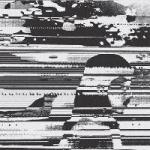
Stygian Stride Stygian Stride
(Thrill Jockey Records)
Jimmy SeiTang is long revered in New York avant-garde circles, associated with Psychic Ills, Rhyton, and the NNCK collective. Although diverse, much of those collaborations centered upon blues, rock, and psychedlic improvisation. His latest self-titled project sees a bold departure into electronica, recorded entirely on analogue equipment, and it gives us an insight into the true expanse of SeiTang’s ambition.
Much like an intense fire, Stygian Stride begins bristling with optimism. Celestial Stems orbits the loop in swooning warmth with unfurling echo and reverb. This easy comfort, like dawn, expands with brightness to shine at its most vibrant in crescendo before descending gradually, and dissipating into dusk.
In the greater scheme of the record, this is the glimpse of unattainable utopia. From then on, there’s a systematic deconstruction of fantasy, with stark visions of a thick veil of swirling spectres. There’s a ritualistic pulse, evident on Drift, which has a hypnotic constancy akin to the devastating motion of a waterfall. Likewise, the relentless force of the track erodes and pervades every fissure with devastating power.
In the sense of discomfort and unease, the natural force of man against his bionic, extended limbs of musicianship shimmers and regurgitates in a reliably ambiguous density. The central motif remains a constant while the adorning accouterments alter and disfigure, creating a warped interpretation of the motif itself. The looped motion of arpeggios, prominent on Taiga, equate to an impending, inevitable implosion. The canopy fizzles while smooth strokes of bass brush, resistant with increasing intensity. Is this the spread of life akin to the Boreal forest? Or rather, a metaphor for how humans have similarly expanded, consumed and changed the land which they inhabit.
In the alchemical allusion of Athanor Ascension we meet a resolving bassline as the narrative moves from joy to despair and, now, hope. Perhaps this speaks of SeiTang’s ambition for the record, turning basic elements into precious compounds of sound.
Whilst the majority of Stygian Stride is an abstract pulsing mass, beneath there is a narrative that draws the listener through an intense display without losing purpose. By the end, Celestial Stems almost seems like a mocking gesture that says, "Did you think it was that easy?" Instead, as a reaction to that track, we get demonic apparitions that consume any speck of sentimentality. There’s a pragmatic approach underpinning the message that, as a reflection of the society which inspired it, seems pretty bleak.
There aren’t relieving passages to soothe the paranoid drones, or any human element whatsoever. This place is a barren wasteland, devoid of life and destitute. The few dying chirps on Fade into Bolivian resonate as painfully lost and abandoned. Is this a warning of what’s to come? Is this a reflection of what is? It depends on the interpretation. What is undeniable is the undercurrent of pain and despair that cannot help but seep to the surface despite the understated approach. Why we end up in this dystopian cauldron seems, perhaps, the point of the entire record, and each exploration will find different clues. The issue, as always with instrumental music, is whether the search and exploration can carry the interest for long enough to extract the deep minerals of meaning, which although abstract, are certainly there.
17 March, 2013 - 04:13 — Matt Bevington